7A Unit 4 My day.基础知识梳理+综合练习(Comic Strip - Task )随堂练习(含答案解析)
文档属性
| 名称 | 7A Unit 4 My day.基础知识梳理+综合练习(Comic Strip - Task )随堂练习(含答案解析) | 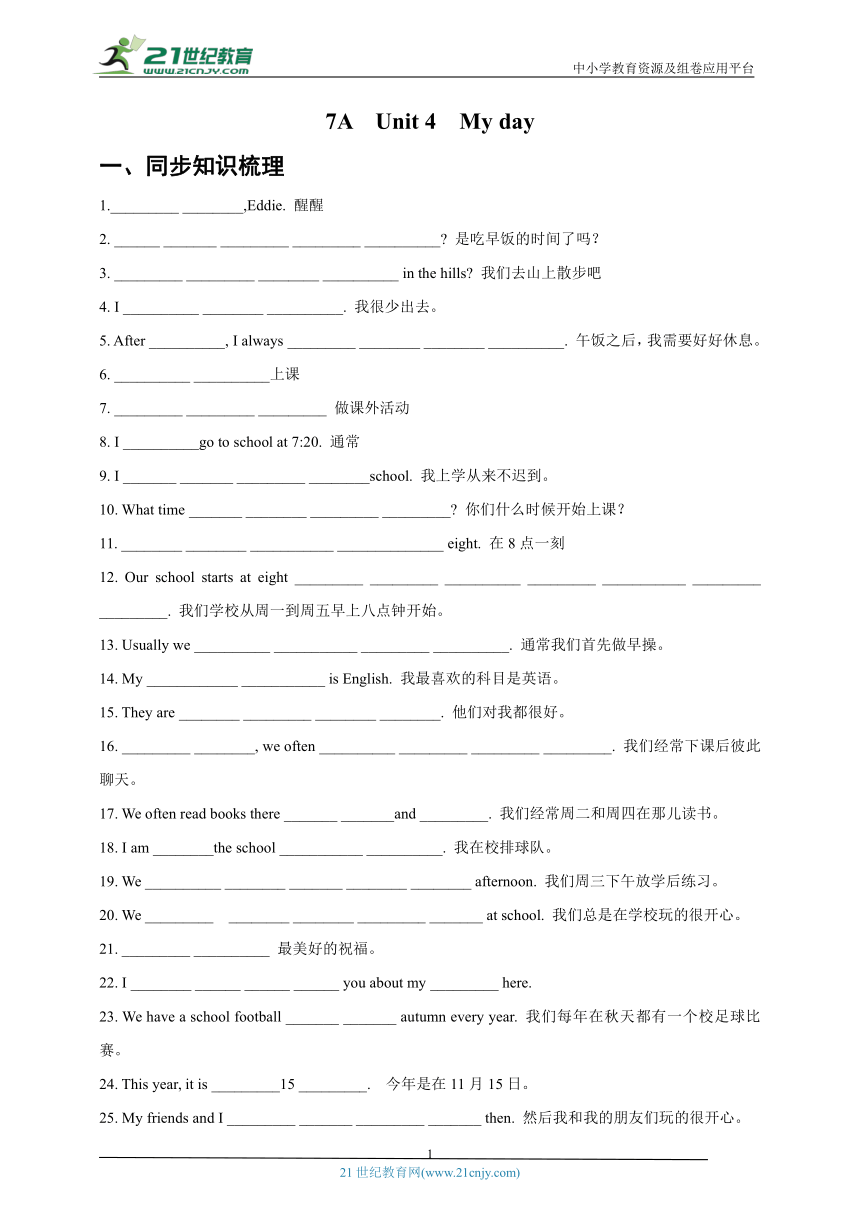 | |
| 格式 | zip | ||
| 文件大小 | 1.3MB | ||
| 资源类型 | 试卷 | ||
| 版本资源 | 牛津译林版 | ||
| 科目 | 英语 | ||
| 更新时间 | 2022-09-19 10:49:10 | ||
图片预览

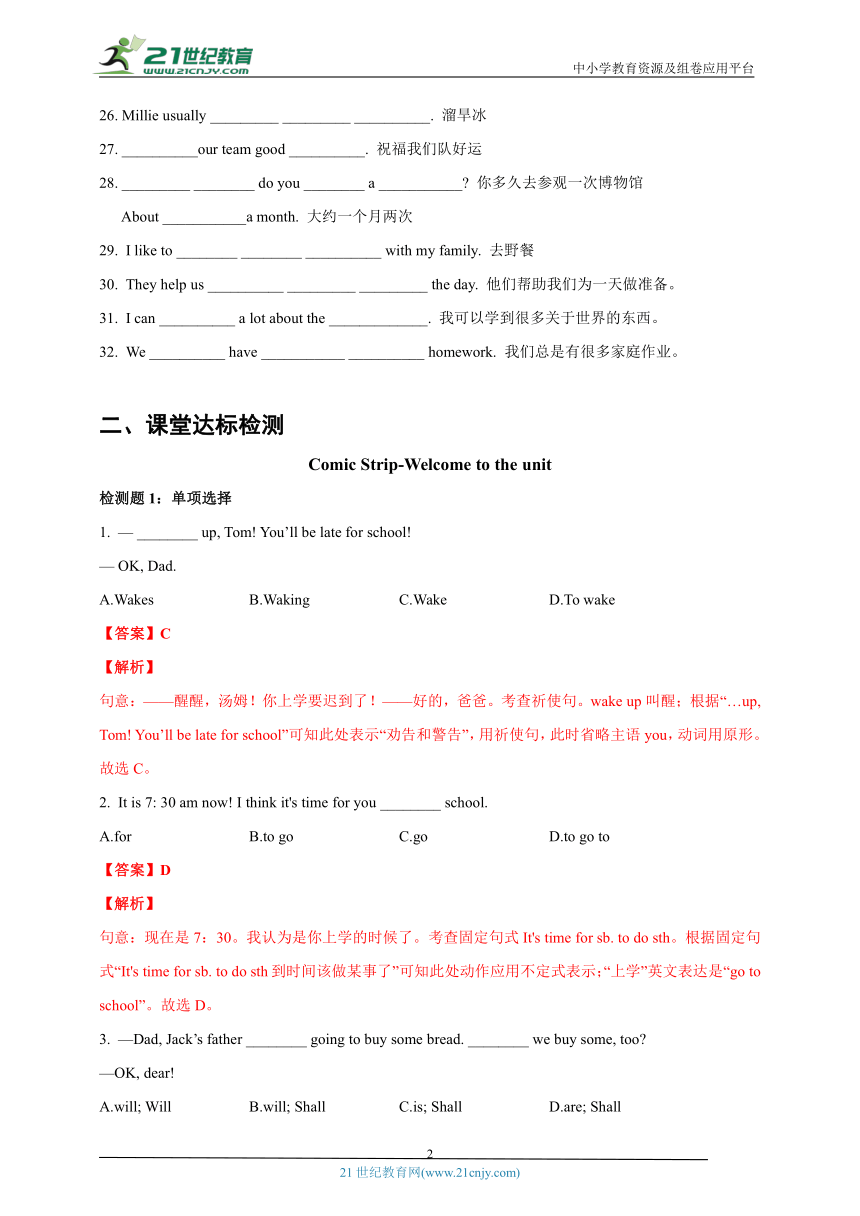
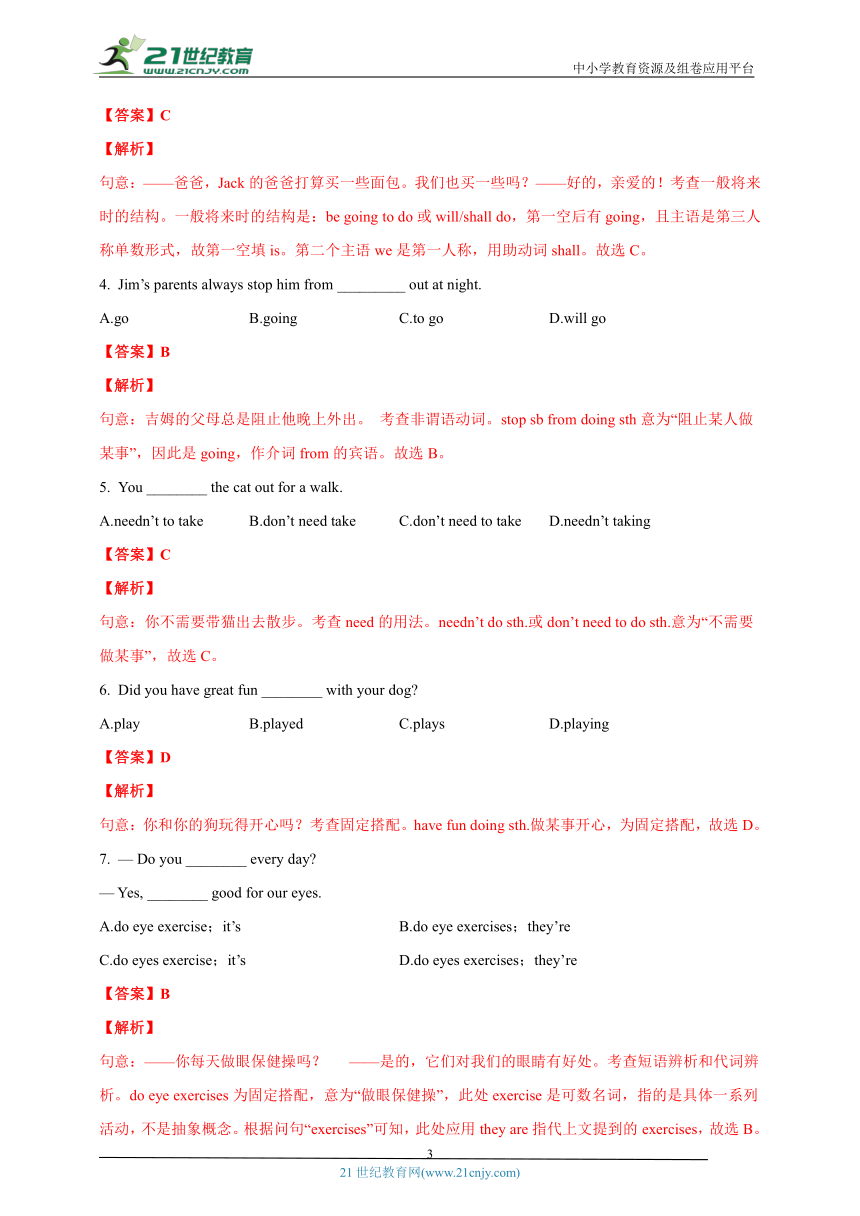
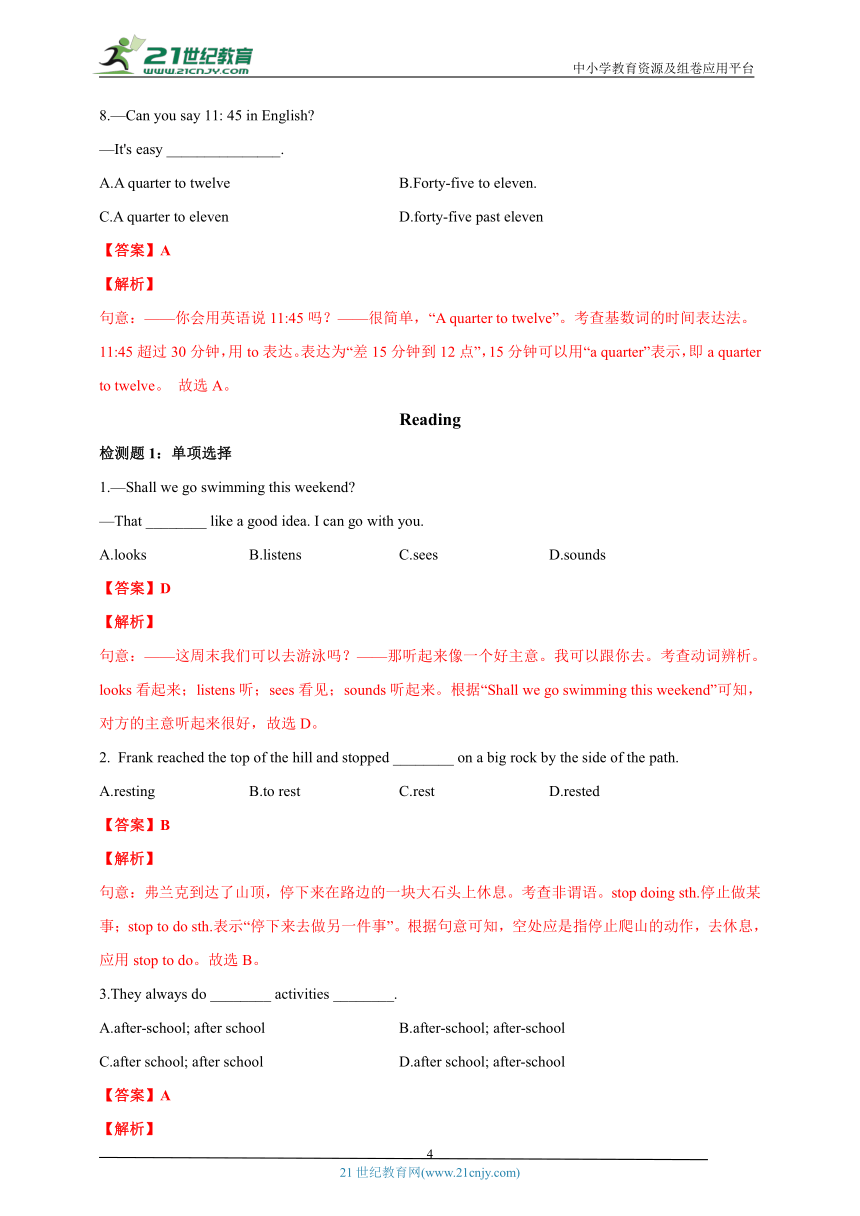
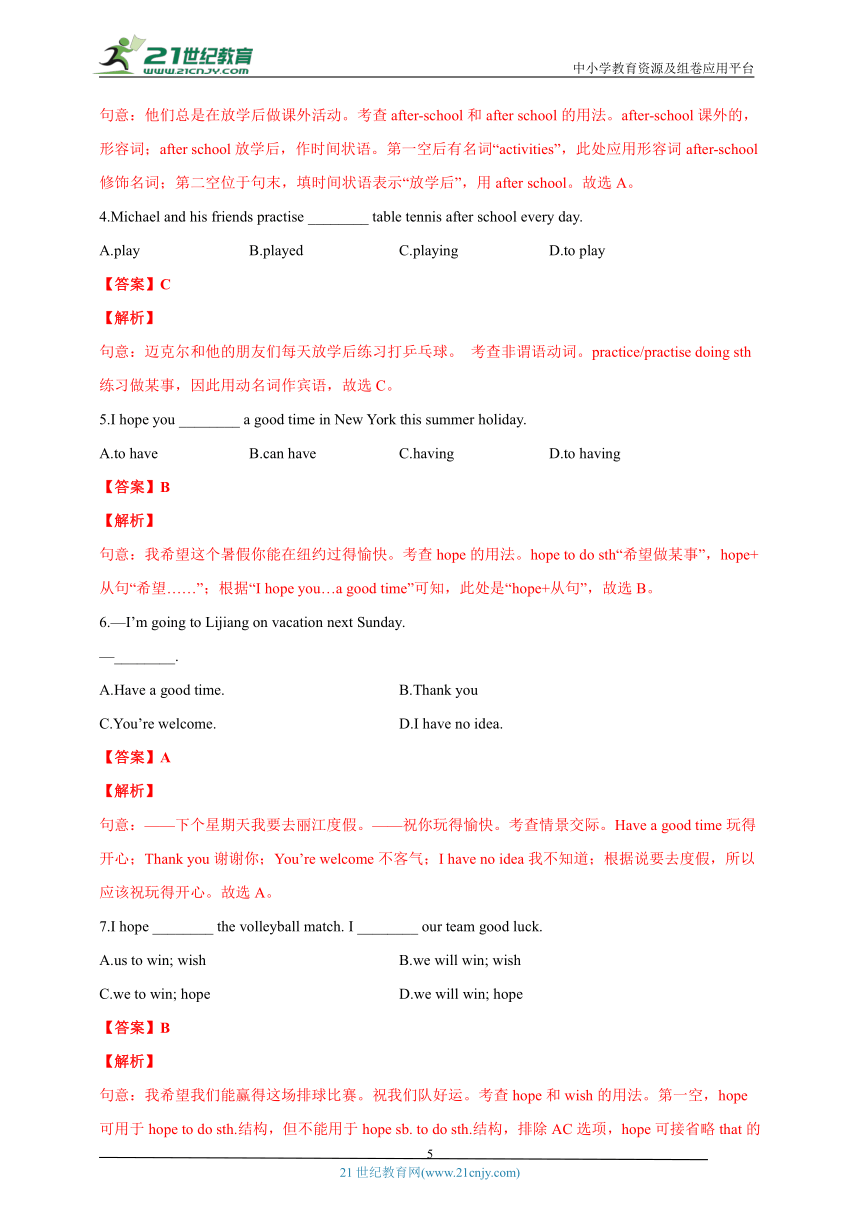
文档简介
中小学教育资源及组卷应用平台
7A Unit 4 My day
一、同步知识梳理
1._________ ________,Eddie. 醒醒
2. ______ _______ _________ _________ __________ 是吃早饭的时间了吗?
3. _________ _________ ________ __________ in the hills 我们去山上散步吧
4. I __________ ________ __________. 我很少出去。
5. After __________, I always _________ ________ ________ __________. 午饭之后,我需要好好休息。
6. __________ __________上课
7. _________ _________ _________ 做课外活动
8. I __________go to school at 7:20. 通常
9. I _______ _______ _________ ________school. 我上学从来不迟到。
10. What time _______ ________ _________ _________ 你们什么时候开始上课?
11. ________ ________ ___________ ______________ eight. 在8点一刻
12. Our school starts at eight _________ _________ __________ _________ ___________ _________ _________. 我们学校从周一到周五早上八点钟开始。
13. Usually we __________ ___________ _________ __________. 通常我们首先做早操。
14. My ____________ ___________ is English. 我最喜欢的科目是英语。
15. They are ________ _________ ________ ________. 他们对我都很好。
16. _________ ________, we often __________ _________ _________ _________. 我们经常下课后彼此聊天。
17. We often read books there _______ _______and _________. 我们经常周二和周四在那儿读书。
18. I am ________the school ___________ __________. 我在校排球队。
19. We __________ ________ _______ ________ ________ afternoon. 我们周三下午放学后练习。
20. We _________ ________ ________ _________ _______ at school. 我们总是在学校玩的很开心。
21. _________ __________ 最美好的祝福。
22. I ________ ______ ______ ______ you about my _________ here.
23. We have a school football _______ _______ autumn every year. 我们每年在秋天都有一个校足球比赛。
24. This year, it is _________15 _________. 今年是在11月15日。
25. My friends and I _________ _______ _________ _______ then. 然后我和我的朋友们玩的很开心。
26. Millie usually _________ _________ __________. 溜旱冰
27. __________our team good __________. 祝福我们队好运
28. _________ ________ do you ________ a ___________ 你多久去参观一次博物馆
About ___________a month. 大约一个月两次
I like to ________ ________ __________ with my family. 去野餐
They help us __________ _________ _________ the day. 他们帮助我们为一天做准备。
I can __________ a lot about the _____________. 我可以学到很多关于世界的东西。
We __________ have ___________ __________ homework. 我们总是有很多家庭作业。
二、课堂达标检测
Comic Strip-Welcome to the unit
检测题1:单项选择
— ________ up, Tom! You’ll be late for school!
— OK, Dad.
A.Wakes B.Waking C.Wake D.To wake
【答案】C
【解析】
句意:——醒醒,汤姆!你上学要迟到了!——好的,爸爸。考查祈使句。wake up叫醒;根据“…up, Tom! You’ll be late for school”可知此处表示“劝告和警告”,用祈使句,此时省略主语you,动词用原形。故选C。
It is 7: 30 am now! I think it's time for you ________ school.
A.for B.to go C.go D.to go to
【答案】D
【解析】
句意:现在是7:30。我认为是你上学的时候了。考查固定句式It's time for sb. to do sth。根据固定句式“It's time for sb. to do sth到时间该做某事了”可知此处动作应用不定式表示;“上学”英文表达是“go to school”。故选D。
—Dad, Jack’s father ________ going to buy some bread. ________ we buy some, too
—OK, dear!
A.will; Will B.will; Shall C.is; Shall D.are; Shall
【答案】C
【解析】
句意:——爸爸,Jack的爸爸打算买一些面包。我们也买一些吗?——好的,亲爱的!考查一般将来时的结构。一般将来时的结构是:be going to do或will/shall do,第一空后有going,且主语是第三人称单数形式,故第一空填is。第二个主语we是第一人称,用助动词shall。故选C。
Jim’s parents always stop him from _________ out at night.
A.go B.going C.to go D.will go
【答案】B
【解析】
句意:吉姆的父母总是阻止他晚上外出。 考查非谓语动词。stop sb from doing sth意为“阻止某人做某事”,因此是going,作介词from的宾语。故选B。
You ________ the cat out for a walk.
A.needn’t to take B.don’t need take C.don’t need to take D.needn’t taking
【答案】C
【解析】
句意:你不需要带猫出去散步。考查need的用法。needn’t do sth.或don’t need to do sth.意为“不需要做某事”,故选C。
Did you have great fun ________ with your dog
A.play B.played C.plays D.playing
【答案】D
【解析】
句意:你和你的狗玩得开心吗?考查固定搭配。have fun doing sth.做某事开心,为固定搭配,故选D。
— Do you ________ every day
— Yes, ________ good for our eyes.
A.do eye exercise;it’s B.do eye exercises;they’re
C.do eyes exercise;it’s D.do eyes exercises;they’re
【答案】B
【解析】
句意:——你每天做眼保健操吗? ——是的,它们对我们的眼睛有好处。考查短语辨析和代词辨析。do eye exercises为固定搭配,意为“做眼保健操”,此处exercise是可数名词,指的是具体一系列活动,不是抽象概念。根据问句“exercises”可知,此处应用they are指代上文提到的exercises,故选B。
8.—Can you say 11: 45 in English
—It's easy _______________.
A.A quarter to twelve B.Forty-five to eleven.
C.A quarter to eleven D.forty-five past eleven
【答案】A
【解析】
句意:——你会用英语说11:45吗?——很简单,“A quarter to twelve”。考查基数词的时间表达法。11:45超过30分钟,用to表达。表达为“差15分钟到12点”,15分钟可以用“a quarter”表示,即a quarter to twelve。 故选A。
Reading
检测题1:单项选择
1.—Shall we go swimming this weekend
—That ________ like a good idea. I can go with you.
A.looks B.listens C.sees D.sounds
【答案】D
【解析】
句意:——这周末我们可以去游泳吗?——那听起来像一个好主意。我可以跟你去。考查动词辨析。looks看起来;listens听;sees看见;sounds听起来。根据“Shall we go swimming this weekend”可知,对方的主意听起来很好,故选D。
Frank reached the top of the hill and stopped ________ on a big rock by the side of the path.
A.resting B.to rest C.rest D.rested
【答案】B
【解析】
句意:弗兰克到达了山顶,停下来在路边的一块大石头上休息。考查非谓语。stop doing sth.停止做某事;stop to do sth.表示“停下来去做另一件事”。根据句意可知,空处应是指停止爬山的动作,去休息,应用stop to do。故选B。
3.They always do ________ activities ________.
A.after-school; after school B.after-school; after-school
C.after school; after school D.after school; after-school
【答案】A
【解析】
句意:他们总是在放学后做课外活动。考查after-school和after school的用法。after-school课外的,形容词;after school放学后,作时间状语。第一空后有名词“activities”,此处应用形容词after-school修饰名词;第二空位于句末,填时间状语表示“放学后”,用after school。故选A。
4.Michael and his friends practise ________ table tennis after school every day.
A.play B.played C.playing D.to play
【答案】C
【解析】
句意:迈克尔和他的朋友们每天放学后练习打乒乓球。 考查非谓语动词。practice/practise doing sth练习做某事,因此用动名词作宾语,故选C。
5.I hope you ________ a good time in New York this summer holiday.
A.to have B.can have C.having D.to having
【答案】B
【解析】
句意:我希望这个暑假你能在纽约过得愉快。考查hope的用法。hope to do sth“希望做某事”,hope+从句“希望……”;根据“I hope you…a good time”可知,此处是“hope+从句”,故选B。
6.—I’m going to Lijiang on vacation next Sunday.
—________.
A.Have a good time. B.Thank you
C.You’re welcome. D.I have no idea.
【答案】A
【解析】
句意:——下个星期天我要去丽江度假。——祝你玩得愉快。考查情景交际。Have a good time玩得开心;Thank you谢谢你;You’re welcome不客气;I have no idea我不知道;根据说要去度假,所以应该祝玩得开心。故选A。
7.I hope ________ the volleyball match. I ________ our team good luck.
A.us to win; wish B.we will win; wish
C.we to win; hope D.we will win; hope
【答案】B
【解析】
句意:我希望我们能赢得这场排球比赛。祝我们队好运。考查hope和wish的用法。第一空,hope可用于hope to do sth.结构,但不能用于hope sb. to do sth.结构,排除AC选项,hope可接省略that的宾语从句,选项BD的“we will win”是hope后接宾语从句的用法,符合语法及语境;第二空,“our team good luck”为双宾语,wish能接双宾语表示祝愿,而hope不能接双宾语。故选B。
8.—I believe you’ll try your best and I wish you ________.
—Thank you.
A.succeed B.success C.successful D.successfully
【答案】B
【解析】
句意:——我相信你会尽力的,祝你成功。——谢谢你。考查双宾语。succeed是动词,成功;success是名词,成功;successful是形容词,成功的;successfully是副词,成功地。wish sb. sth.祝愿某人某事,此处是表示祝愿的话语,用名词的形式作直接宾语,wish you success“祝你成功”。故选B。
检测题2:按照汉语意思填空。
1.He just ________ (希望) to have a happy life.
【答案】wishes
【解析】
句意:他只是希望过上幸福的生活。陈述一般事实,用一般现在时,主语“He”后接动词的第三人称单数形式wishes。故填wishes。
2.In my opinion, children should always come ________ (首先).
【答案】first
【解析】
句意:依我看,孩子们应该总是先来。这里放在动词的后面,come first 固定短语,这里first做副词用来修饰come,故填first。
3.On Christmas Eve, people put presents in ____ ____ stockings. (彼此)
【答案】each other’s
【解析】
根据中英文对比可知,空格处应填意为“彼此的”短语。each other意为“彼此”,其所有格形式为each other’s,意为“彼此的”,符合句意,故填each;other’s。:
Grammar
检测题1:单项选择。
1.Chang’e 5 returned to the earth successfully _________ the early morning of December17, 2020.
A.in B.at C.on D.for
【答案】C
【解析】
句意:嫦娥5号于2020年12月17日凌晨成功返回地球。考查介词辨析。in后接年、月、季节、泛指的上下午或晚上等;at后接具体钟表时刻;on后接具体的日期、具体某一天的上下午或晚上等;for接时间段;根据“the early morning of December17, 2020”表示在具体某一天早上;故选C。
2.— We’ll have a hiking trip, but when shall we meet
— Let’s make it ________ half past seven ________ the morning of May 21st.
A.at, in B./, on C./, in D.at, on
【答案】B
【解析】
句意:——我们要去远足,但我们什么时候见面?——咱们定在5月21号早上的七点半吧。考查介词。“make it+时间点”表示“把时间定在……”,固定用法,时间点前不加介词,排除AD;在某一天的早中晚用介词on。故选B。
3.They arrived there ________ cold Sunday afternoon.
A.in the B.on the C.in a D.on a
【答案】D
【解析】
句意:他们在一个寒冷的星期天下午到达那里。考查冠词和介词。根据“cold Sunday afternoon”可知,是一个单数,需要冠词“a”修饰,表示泛指;而“a cold Sunday afternoon”是具体的一天的下午,因此用时间介词on。故选D。
4.Betty will have her party ________.
A.on 2013,December 23th B.at December 23rd,2013
C.on December 23rd,2013 D.in 2013,23rd December
【答案】C
【解析】
句意:贝蒂将在2013年12月23日开晚会。考查介词和日期的表达。on指具体的某一天;in指某年某月某个上下午;at具体的点钟。句子表达具体的日期,用介词“on”。日期的表达顺序是“月、日、年”,表达“2013年12月23日”用“December 23rd,2013”。故选C。
5. ________ the evening of May 1st, they went to Tom’s birthday party.
A.On B.At C.Of D.In
【答案】A
【解析】
句意:在五月一日的晚上,他们去了汤姆的生日晚会。考查介词。on具体某一天;at具体几点钟;of属于……的;in指某年,某月或上下午。根据“the evening of May 1”可知具体的某一天的晚上,用介词“on”。故选A。
6.Thanksgiving is always ________ the fourth Thursday ________ November.
A.on;on B.in;in C.on;in D.in;on
【答案】C
【解析】
句意:感恩节总是在十一月的第四个星期四。考查介词辨析。on其后加星期或具体的时间;in其后加早中晚/月份/季节/年份等。第一处“the fourth Thursday”应该用on,第二处November应该用in。故选C。
7.They are going to the party ________ next Sunday.
A.in B.on C.for D./
【答案】D
【解析】
句意:他们打算下星期天去参加聚会。考查时间介词。in后面跟早中晚、季节、月份;on后面跟具体的某一天;for后面跟一段时间。当有next、last、this、every修饰时间时,一律不用任何介词。故选D。
8.— Would you like to drink a glass of juice
— ________.
A.Yes, I’d love to B.No, I’d love to C.Don’t ask me D.Sorry, I can’t
【答案】A
【解析】
句意:——你想喝一杯果汁吗?——是的,我很乐意。考查情景交际。Yes, I’d love to是的,我很乐意;No, I’d love to不,我很乐意;Don’t ask me别问我;Sorry, I can’t对不起,我不能。根据“你想喝一杯果汁吗?”可知,回答用“是的,我很乐意”。故选A。
Integrated Skills - Task
检测题1:单项选择
1.We _______ half an hour _______ on the playground after class.
A.spend; to practise running B.take; to practise to run
C.spend; practising running D.take; to practise running
【答案】C
【解析】
句意:下课后我们花了半个小时在操场上练习跑步。考查动词辨析及动词非谓语。spend“花费”,主语常常是人,常用结构为:sb. spend+time/money+in+doing sth.,表示“某人花费金钱/时间来做某事”;take“花费”,常用结构为:It takes sb.+time+to do sth.,表示“做某事花费某人多少时间”;根据题干,主语是人,用spend,practise表示“练习”,后面接动名词形式,故选C。
2.I hope you ________ a good time in New York this summer holiday.
A.to have B.can have C.having D.to having
【答案】B
【解析】
句意:我希望这个暑假你能在纽约过得愉快。考查hope的用法。hope to do sth“希望做某事”,hope+从句“希望……”;根据“I hope you…a good time”可知,此处是“hope+从句”,故选B。
3.— Do you think it’s going to rain this afternoon
— ________ We’re just planning to have a picnic later this afternoon.
A.I hope not. B.I expect so. C.Yes, it was. D.No, I won’t.
【答案】A
【解析】
句意:——你认为今天下午会下雨吗?——我希望不下。我们计划今天下午晚些时候去野餐。考查情景交际。I hope not我希望不;I expect so我期盼这样;Yes, it was是的,它是;No, I won’t不,我不会。根据“We’ re just planning to have a picnic later this afternoon.”可知,下午计划去野餐,所以不希望下雨。故选A。
— Carl had an accident. He hurt one of his legs yesterday.
— ______! I hope he gets better soon.
A.No way B.Hurry up C.Look out D.Bad luck
【答案】D
【解析】
句意:—— 卡尔出车祸了。他昨天伤了一条腿。—— 坏运气!我希望他快点好起来。考查情景交际。No way没门;Hurry up赶快;Look out小心;Bad luck坏运气。根据“He hurt one of his legs yesterday.”可知,卡尔运气不好。故选D。
5.—How often does Mike go to the Internet Café
—________. He is so busy with his study.
A.Almost every day B.Hardly ever C.Always D.Usually
【答案】B
【解析】
句意:——Mike多久去网咖一次?——几乎不去。他学习太忙了。考查特殊疑问句和频度副词。Almost every day几乎每天;Hardly ever几乎不;Always总是;Usually通常。根据问句中“How often”可知是对频度的提问,结合答句中“He is so busy with his study.”说Mike忙于学习,可推出他几乎不去网咖,用“Hardly ever”符合题意。故选B。
6.You shouldn’t give them ________ ice cream.
A.much too B.too much C.too many D.many too
【答案】B
【解析】
句意:你不应该给他们太多的冰淇淋。考查短语辨析。much too太,修饰形容词或副词;too much太多,修饰不可数名词;too many太多,修饰可数名词复数;many too错误用法。根据“ice cream”是不可数名词,所以用too much修饰。故选B。
检测题2:按照单词适当形式填空。
1.We would like everyone _______ (come) to our party.
【答案】to come
【解析】
句意:我们想要每个人都来参加我们的派对。固定搭配:would like sb to do sth“想要某人做某事”,故填to come。
2.All the students wish __________(get) good grades in the coming exams. We wish you good luck.
【答案】to get
【解析】
句意:所有的学生都希望在即将到来的考试中取得好成绩。我们祝你好运。空格处所给参考单词为get。wish to do sth.为固定搭配,意为“想(愿意)做某事”,故get应用动词不定式,故答案为to get。
3.We are really ________(luck)to go to Hong Kong Disney Park.
【答案】lucky
【解析】
句意:我们能去香港迪士尼乐园真是太幸运了。系动词are后接形容词作表语,luck是名词,形容词是lucky“幸运的”,故填lucky。
4._________(luck),everyone in our class passed the exam this time.
【答案】Luckily
【解析】
句意:幸运的是,我们班每个人都通过了这次考试。分析句子,副词通常可以放于句首,可以修饰整个句子。luck是名词,其副词形式是luckily。故填Luckily。
5.He just ________ (wish) to have a happy life.
【答案】wishes
【解析】
句意:他只是希望过上幸福的生活。陈述一般事实,用一般现在时,主语“He”后接动词的第三人称单数形式wishes。故填wishes。
课后作业
作业1:完形填空。
Jim Green is an announcer(播音员)for a programme (节目). Most of the girls 1 boys like the programme. They 2 like Jim Green. Some of them often make phone calls to him and thank him 3 his work. There are lots of 4 to him every day too.
Jim Green gets up at 6:00 every morning. He has bread and a glass of milk 5 breakfast. He leaves home at 6:30 and 6 his office at 7:15 a.m.
The programme 7 at 7:30 a.m. He plays the new records (唱片)of the pop songs and modern music for his listeners. At 8:00 a.m., it’s time 8 the news.
Jim finishes his work at 10:30 p.m. He goes home 9 his car. He 10 newspaper and listens to music after supper. He thinks his life is very interesting.
1.A.and B.with C.but D.about
2.A.too B.to C.also D.so
3.A.to B.for C.of D.and
4.A.letter B.letters C.friends D.words
5.A.at B.with C.for D.to
6.A.goes B.gets C.gets to D.gets up
7.A.begins B.finishes C.over D.start
8.A.to B.for C.of D.in
9.A.by B.in C.on D.takes
10.A.looks B.reads C.sees D.watches
【答案】 1-5 ACBBC 6-10 CABBB
【文章大意】
本文是一篇记叙文,主要介绍了播音员Jim格林的一天的活动安排。
【解析】
1.句意:大多数男孩和女孩都喜欢这个节目。and和;with带有;but但是;about关于。句中“girls”和“boys”为并列成分,故用连词and连接。故选A。
2.句意:他们也喜欢Jim Green。too也,放在肯定句句末;to到;also也,用于句中;so因此。根据前一句“大多数男孩和女孩都喜欢这个节目”可知,此处应为他们也喜欢吉姆;故用副词also位于句中。故选C。
3.句意:他们中的一些人经常给他打电话,对他的工作表示感谢。to到;for为了;of……的;and和,而且。Thank sb. for sth.为固定搭配,意为“为了某事而感谢某人”。故选B。
4.句意:每天也有很多给他的信件。letter信件,名词单数;letters信件,名词复数;friends朋友;words单词。根据上文“Some of them often make phone calls to him and thank him…his work.”可以推知,除了打电话,也可以通过写信来表示感谢;空前lots of“许多”修饰可数名词复数,故此处应用letter复数形式。故选B。
5.句意:他早餐吃面包并喝一杯牛奶。at在,后跟地方或时间;with和,伴随;for为了,给;to去。表示“一日三餐吃什么”介词应用for。故选C。
6.句意:他在早晨7:15到达办公室。goes走;gets得到;gets to到达;gets up起床。根据前半句“他在早晨6:30离开家”可以推知,他在早晨7:15到达办公室。故选C。
7.句意:节目在7:30开始。begins开始;finishes完成;over结束;start开始。根据后一句“他为听众播放流行歌曲和现代音乐的新唱片”可以推知,他在早上7点半开始工作,The programme为单数,动词用第三人称单数形式。故选A。
8.句意:早上8点是新闻时间。to到;for为了;of……的;in在……里面。It’s time for sth.意为“到……的时间了”,故选B。
9.句意:他开车回家。by乘坐,后跟交通工具;in在……里面;on在……上面;takes花费。因为car前面有his,所以不能用by,介词应用in。故选B。
10.句意:晚饭后他读报纸和听音乐。looks看;reads阅读;sees看见;watches观看。根据空格后的newspaper可知,空处应用动词read与之搭配,意为“读报纸”。故选B。
作业2:阅读理解
A
Everyone knows that exercise is important. We all need to exercise. Doctors say it is good for us. It makes your heart and body strong. Children who often exercise are more alert (灵活的). This means they do better in tests and schoolwork than those who don’t exercise.
There are many ways to exercise. You can walk, run, swim, skate or play ball games. Make sure you exercise in the following ways: You have to like what you’re doing. Exercise enough, but not too much. It’s best to exercise twice each week. Thirty minutes each time is enough. Try all kinds of things until you find one, two or even three sports that you feel right for yourself.
You can exercise at fitness centres (健身中心). They have a lot of equipment (设备) there. The equipment will help exercise your arms, legs and other parts of your body to make you fit. Some people buy equipment for homes. But it is very expensive.
Exercising can be fun. Friends can exercise together at a fitness centre, or they can play sports together. How do you exercise
1.In the passage, the writer tells us that we all need to ________ .
A.drink B.sleep C.exercise D.work
2.Which of the following sports is NOT mentioned in the passage
A.Fishing. B.Running. C.Swimming. D.Walking.
3.Exercise makes your ________ and body strong.
A.head B.hands C.arms D.heart
4.According to the passage, it’s best to exercise ________ each week.
A.once B.twice C.three times D.four times
【答案】CADB
【文章大意】
本文介绍了运动健身的重要性及运动健身的方法等。
【解析】
细节理解题。根据“We all need to exercise.”可知,我们都需要锻炼。故选C。
细节理解题。根据“You can walk, run, swim, skate or play ball games.”可知,钓鱼没有提及。故选A。
细节理解题。根据“It makes your heart and body strong.”可知,它使你的心脏和身体强壮。故选D。
细节理解题。根据“It’s best to exercise twice each week.”可知,最好每周锻炼两次。故选B。
B
Johnson is an eight-year-old boy and he is a good boy. Johnson does well in all his lessons. He loves school and he is always active in class. Every time the teacher asks a question, Johnson always puts up his hand quickly. Sometimes his answer is wrong, but the teacher always smiles (微笑) and says, “Good, Johnson. But is there a better answer to my question ”
One day, the teacher asks the boys and girls a question. “Swallows (燕子) fly to the south before winter is coming ” he says. “But why don’t cats and dogs do the same ”
Johnson lifts (举) his hand as usual.
“Yes, Johnson ” says the teacher happily.
Johnson stands up and says, “Because they have no wings(翅膀). ”
5.How old is Johnson
A.5 years old. B.6 years old.
C.7 years old. D.8 years old.
6.Which lesson does Johnson do well in
A.Maths. B.English.
C.Chinese. D.All his lessons.
.What does Johnson always do when the teacher asks a question
A.He always puts up his hand quickly. B.He always puts up his hand slowly.
C.He doesn’t always put up his hand. D.He always laughs.
8.From this passage we know________ .
A.Johnson is a good schoolboy B.the teacher loves Johnson very much
C.Johnson’s answer is always right D.A and B
【答案】DDAD
【文章大意】
句意:本文主要讲述了一位8岁的男孩Johnson很喜欢在课堂上回答问题,一天老师询问为什么燕子在冬天来临之前飞到南方,而狗和猫却不这样做,Johnson说因为它们没有翅膀。
【解析】
细节理解题。根据“Johnson is an eight-year-old boy”可知,他8岁,故选D。
细节理解题。根据“Johnson does well in all his lessons”可知,所有功课都学得很好,故选D。
细节理解题。根据“Every time the teacher asks a question, Johnson always puts up his hand quickly”可知,每当老师提问题,他总是快速地举手,故选A。
推理判断题。根据“he is a good boy”及“Sometimes his answer is wrong, but the teacher always smiles (微笑) and says, “Good, Johnson. But is there a better answer to my question ””可知,Johnson是一位优秀的男孩,每当他回答错问题时,老师总是用另一种方法提醒他,可见老师是很喜欢他的, 故选D。
21世纪教育网 www.21cnjy.com 精品试卷·第 2 页 (共 2 页)
HYPERLINK "http://21世纪教育网(www.21cnjy.com)
" 21世纪教育网(www.21cnjy.com)
7A Unit 4 My day
一、同步知识梳理
1._________ ________,Eddie. 醒醒
2. ______ _______ _________ _________ __________ 是吃早饭的时间了吗?
3. _________ _________ ________ __________ in the hills 我们去山上散步吧
4. I __________ ________ __________. 我很少出去。
5. After __________, I always _________ ________ ________ __________. 午饭之后,我需要好好休息。
6. __________ __________上课
7. _________ _________ _________ 做课外活动
8. I __________go to school at 7:20. 通常
9. I _______ _______ _________ ________school. 我上学从来不迟到。
10. What time _______ ________ _________ _________ 你们什么时候开始上课?
11. ________ ________ ___________ ______________ eight. 在8点一刻
12. Our school starts at eight _________ _________ __________ _________ ___________ _________ _________. 我们学校从周一到周五早上八点钟开始。
13. Usually we __________ ___________ _________ __________. 通常我们首先做早操。
14. My ____________ ___________ is English. 我最喜欢的科目是英语。
15. They are ________ _________ ________ ________. 他们对我都很好。
16. _________ ________, we often __________ _________ _________ _________. 我们经常下课后彼此聊天。
17. We often read books there _______ _______and _________. 我们经常周二和周四在那儿读书。
18. I am ________the school ___________ __________. 我在校排球队。
19. We __________ ________ _______ ________ ________ afternoon. 我们周三下午放学后练习。
20. We _________ ________ ________ _________ _______ at school. 我们总是在学校玩的很开心。
21. _________ __________ 最美好的祝福。
22. I ________ ______ ______ ______ you about my _________ here.
23. We have a school football _______ _______ autumn every year. 我们每年在秋天都有一个校足球比赛。
24. This year, it is _________15 _________. 今年是在11月15日。
25. My friends and I _________ _______ _________ _______ then. 然后我和我的朋友们玩的很开心。
26. Millie usually _________ _________ __________. 溜旱冰
27. __________our team good __________. 祝福我们队好运
28. _________ ________ do you ________ a ___________ 你多久去参观一次博物馆
About ___________a month. 大约一个月两次
I like to ________ ________ __________ with my family. 去野餐
They help us __________ _________ _________ the day. 他们帮助我们为一天做准备。
I can __________ a lot about the _____________. 我可以学到很多关于世界的东西。
We __________ have ___________ __________ homework. 我们总是有很多家庭作业。
二、课堂达标检测
Comic Strip-Welcome to the unit
检测题1:单项选择
— ________ up, Tom! You’ll be late for school!
— OK, Dad.
A.Wakes B.Waking C.Wake D.To wake
【答案】C
【解析】
句意:——醒醒,汤姆!你上学要迟到了!——好的,爸爸。考查祈使句。wake up叫醒;根据“…up, Tom! You’ll be late for school”可知此处表示“劝告和警告”,用祈使句,此时省略主语you,动词用原形。故选C。
It is 7: 30 am now! I think it's time for you ________ school.
A.for B.to go C.go D.to go to
【答案】D
【解析】
句意:现在是7:30。我认为是你上学的时候了。考查固定句式It's time for sb. to do sth。根据固定句式“It's time for sb. to do sth到时间该做某事了”可知此处动作应用不定式表示;“上学”英文表达是“go to school”。故选D。
—Dad, Jack’s father ________ going to buy some bread. ________ we buy some, too
—OK, dear!
A.will; Will B.will; Shall C.is; Shall D.are; Shall
【答案】C
【解析】
句意:——爸爸,Jack的爸爸打算买一些面包。我们也买一些吗?——好的,亲爱的!考查一般将来时的结构。一般将来时的结构是:be going to do或will/shall do,第一空后有going,且主语是第三人称单数形式,故第一空填is。第二个主语we是第一人称,用助动词shall。故选C。
Jim’s parents always stop him from _________ out at night.
A.go B.going C.to go D.will go
【答案】B
【解析】
句意:吉姆的父母总是阻止他晚上外出。 考查非谓语动词。stop sb from doing sth意为“阻止某人做某事”,因此是going,作介词from的宾语。故选B。
You ________ the cat out for a walk.
A.needn’t to take B.don’t need take C.don’t need to take D.needn’t taking
【答案】C
【解析】
句意:你不需要带猫出去散步。考查need的用法。needn’t do sth.或don’t need to do sth.意为“不需要做某事”,故选C。
Did you have great fun ________ with your dog
A.play B.played C.plays D.playing
【答案】D
【解析】
句意:你和你的狗玩得开心吗?考查固定搭配。have fun doing sth.做某事开心,为固定搭配,故选D。
— Do you ________ every day
— Yes, ________ good for our eyes.
A.do eye exercise;it’s B.do eye exercises;they’re
C.do eyes exercise;it’s D.do eyes exercises;they’re
【答案】B
【解析】
句意:——你每天做眼保健操吗? ——是的,它们对我们的眼睛有好处。考查短语辨析和代词辨析。do eye exercises为固定搭配,意为“做眼保健操”,此处exercise是可数名词,指的是具体一系列活动,不是抽象概念。根据问句“exercises”可知,此处应用they are指代上文提到的exercises,故选B。
8.—Can you say 11: 45 in English
—It's easy _______________.
A.A quarter to twelve B.Forty-five to eleven.
C.A quarter to eleven D.forty-five past eleven
【答案】A
【解析】
句意:——你会用英语说11:45吗?——很简单,“A quarter to twelve”。考查基数词的时间表达法。11:45超过30分钟,用to表达。表达为“差15分钟到12点”,15分钟可以用“a quarter”表示,即a quarter to twelve。 故选A。
Reading
检测题1:单项选择
1.—Shall we go swimming this weekend
—That ________ like a good idea. I can go with you.
A.looks B.listens C.sees D.sounds
【答案】D
【解析】
句意:——这周末我们可以去游泳吗?——那听起来像一个好主意。我可以跟你去。考查动词辨析。looks看起来;listens听;sees看见;sounds听起来。根据“Shall we go swimming this weekend”可知,对方的主意听起来很好,故选D。
Frank reached the top of the hill and stopped ________ on a big rock by the side of the path.
A.resting B.to rest C.rest D.rested
【答案】B
【解析】
句意:弗兰克到达了山顶,停下来在路边的一块大石头上休息。考查非谓语。stop doing sth.停止做某事;stop to do sth.表示“停下来去做另一件事”。根据句意可知,空处应是指停止爬山的动作,去休息,应用stop to do。故选B。
3.They always do ________ activities ________.
A.after-school; after school B.after-school; after-school
C.after school; after school D.after school; after-school
【答案】A
【解析】
句意:他们总是在放学后做课外活动。考查after-school和after school的用法。after-school课外的,形容词;after school放学后,作时间状语。第一空后有名词“activities”,此处应用形容词after-school修饰名词;第二空位于句末,填时间状语表示“放学后”,用after school。故选A。
4.Michael and his friends practise ________ table tennis after school every day.
A.play B.played C.playing D.to play
【答案】C
【解析】
句意:迈克尔和他的朋友们每天放学后练习打乒乓球。 考查非谓语动词。practice/practise doing sth练习做某事,因此用动名词作宾语,故选C。
5.I hope you ________ a good time in New York this summer holiday.
A.to have B.can have C.having D.to having
【答案】B
【解析】
句意:我希望这个暑假你能在纽约过得愉快。考查hope的用法。hope to do sth“希望做某事”,hope+从句“希望……”;根据“I hope you…a good time”可知,此处是“hope+从句”,故选B。
6.—I’m going to Lijiang on vacation next Sunday.
—________.
A.Have a good time. B.Thank you
C.You’re welcome. D.I have no idea.
【答案】A
【解析】
句意:——下个星期天我要去丽江度假。——祝你玩得愉快。考查情景交际。Have a good time玩得开心;Thank you谢谢你;You’re welcome不客气;I have no idea我不知道;根据说要去度假,所以应该祝玩得开心。故选A。
7.I hope ________ the volleyball match. I ________ our team good luck.
A.us to win; wish B.we will win; wish
C.we to win; hope D.we will win; hope
【答案】B
【解析】
句意:我希望我们能赢得这场排球比赛。祝我们队好运。考查hope和wish的用法。第一空,hope可用于hope to do sth.结构,但不能用于hope sb. to do sth.结构,排除AC选项,hope可接省略that的宾语从句,选项BD的“we will win”是hope后接宾语从句的用法,符合语法及语境;第二空,“our team good luck”为双宾语,wish能接双宾语表示祝愿,而hope不能接双宾语。故选B。
8.—I believe you’ll try your best and I wish you ________.
—Thank you.
A.succeed B.success C.successful D.successfully
【答案】B
【解析】
句意:——我相信你会尽力的,祝你成功。——谢谢你。考查双宾语。succeed是动词,成功;success是名词,成功;successful是形容词,成功的;successfully是副词,成功地。wish sb. sth.祝愿某人某事,此处是表示祝愿的话语,用名词的形式作直接宾语,wish you success“祝你成功”。故选B。
检测题2:按照汉语意思填空。
1.He just ________ (希望) to have a happy life.
【答案】wishes
【解析】
句意:他只是希望过上幸福的生活。陈述一般事实,用一般现在时,主语“He”后接动词的第三人称单数形式wishes。故填wishes。
2.In my opinion, children should always come ________ (首先).
【答案】first
【解析】
句意:依我看,孩子们应该总是先来。这里放在动词的后面,come first 固定短语,这里first做副词用来修饰come,故填first。
3.On Christmas Eve, people put presents in ____ ____ stockings. (彼此)
【答案】each other’s
【解析】
根据中英文对比可知,空格处应填意为“彼此的”短语。each other意为“彼此”,其所有格形式为each other’s,意为“彼此的”,符合句意,故填each;other’s。:
Grammar
检测题1:单项选择。
1.Chang’e 5 returned to the earth successfully _________ the early morning of December17, 2020.
A.in B.at C.on D.for
【答案】C
【解析】
句意:嫦娥5号于2020年12月17日凌晨成功返回地球。考查介词辨析。in后接年、月、季节、泛指的上下午或晚上等;at后接具体钟表时刻;on后接具体的日期、具体某一天的上下午或晚上等;for接时间段;根据“the early morning of December17, 2020”表示在具体某一天早上;故选C。
2.— We’ll have a hiking trip, but when shall we meet
— Let’s make it ________ half past seven ________ the morning of May 21st.
A.at, in B./, on C./, in D.at, on
【答案】B
【解析】
句意:——我们要去远足,但我们什么时候见面?——咱们定在5月21号早上的七点半吧。考查介词。“make it+时间点”表示“把时间定在……”,固定用法,时间点前不加介词,排除AD;在某一天的早中晚用介词on。故选B。
3.They arrived there ________ cold Sunday afternoon.
A.in the B.on the C.in a D.on a
【答案】D
【解析】
句意:他们在一个寒冷的星期天下午到达那里。考查冠词和介词。根据“cold Sunday afternoon”可知,是一个单数,需要冠词“a”修饰,表示泛指;而“a cold Sunday afternoon”是具体的一天的下午,因此用时间介词on。故选D。
4.Betty will have her party ________.
A.on 2013,December 23th B.at December 23rd,2013
C.on December 23rd,2013 D.in 2013,23rd December
【答案】C
【解析】
句意:贝蒂将在2013年12月23日开晚会。考查介词和日期的表达。on指具体的某一天;in指某年某月某个上下午;at具体的点钟。句子表达具体的日期,用介词“on”。日期的表达顺序是“月、日、年”,表达“2013年12月23日”用“December 23rd,2013”。故选C。
5. ________ the evening of May 1st, they went to Tom’s birthday party.
A.On B.At C.Of D.In
【答案】A
【解析】
句意:在五月一日的晚上,他们去了汤姆的生日晚会。考查介词。on具体某一天;at具体几点钟;of属于……的;in指某年,某月或上下午。根据“the evening of May 1”可知具体的某一天的晚上,用介词“on”。故选A。
6.Thanksgiving is always ________ the fourth Thursday ________ November.
A.on;on B.in;in C.on;in D.in;on
【答案】C
【解析】
句意:感恩节总是在十一月的第四个星期四。考查介词辨析。on其后加星期或具体的时间;in其后加早中晚/月份/季节/年份等。第一处“the fourth Thursday”应该用on,第二处November应该用in。故选C。
7.They are going to the party ________ next Sunday.
A.in B.on C.for D./
【答案】D
【解析】
句意:他们打算下星期天去参加聚会。考查时间介词。in后面跟早中晚、季节、月份;on后面跟具体的某一天;for后面跟一段时间。当有next、last、this、every修饰时间时,一律不用任何介词。故选D。
8.— Would you like to drink a glass of juice
— ________.
A.Yes, I’d love to B.No, I’d love to C.Don’t ask me D.Sorry, I can’t
【答案】A
【解析】
句意:——你想喝一杯果汁吗?——是的,我很乐意。考查情景交际。Yes, I’d love to是的,我很乐意;No, I’d love to不,我很乐意;Don’t ask me别问我;Sorry, I can’t对不起,我不能。根据“你想喝一杯果汁吗?”可知,回答用“是的,我很乐意”。故选A。
Integrated Skills - Task
检测题1:单项选择
1.We _______ half an hour _______ on the playground after class.
A.spend; to practise running B.take; to practise to run
C.spend; practising running D.take; to practise running
【答案】C
【解析】
句意:下课后我们花了半个小时在操场上练习跑步。考查动词辨析及动词非谓语。spend“花费”,主语常常是人,常用结构为:sb. spend+time/money+in+doing sth.,表示“某人花费金钱/时间来做某事”;take“花费”,常用结构为:It takes sb.+time+to do sth.,表示“做某事花费某人多少时间”;根据题干,主语是人,用spend,practise表示“练习”,后面接动名词形式,故选C。
2.I hope you ________ a good time in New York this summer holiday.
A.to have B.can have C.having D.to having
【答案】B
【解析】
句意:我希望这个暑假你能在纽约过得愉快。考查hope的用法。hope to do sth“希望做某事”,hope+从句“希望……”;根据“I hope you…a good time”可知,此处是“hope+从句”,故选B。
3.— Do you think it’s going to rain this afternoon
— ________ We’re just planning to have a picnic later this afternoon.
A.I hope not. B.I expect so. C.Yes, it was. D.No, I won’t.
【答案】A
【解析】
句意:——你认为今天下午会下雨吗?——我希望不下。我们计划今天下午晚些时候去野餐。考查情景交际。I hope not我希望不;I expect so我期盼这样;Yes, it was是的,它是;No, I won’t不,我不会。根据“We’ re just planning to have a picnic later this afternoon.”可知,下午计划去野餐,所以不希望下雨。故选A。
— Carl had an accident. He hurt one of his legs yesterday.
— ______! I hope he gets better soon.
A.No way B.Hurry up C.Look out D.Bad luck
【答案】D
【解析】
句意:—— 卡尔出车祸了。他昨天伤了一条腿。—— 坏运气!我希望他快点好起来。考查情景交际。No way没门;Hurry up赶快;Look out小心;Bad luck坏运气。根据“He hurt one of his legs yesterday.”可知,卡尔运气不好。故选D。
5.—How often does Mike go to the Internet Café
—________. He is so busy with his study.
A.Almost every day B.Hardly ever C.Always D.Usually
【答案】B
【解析】
句意:——Mike多久去网咖一次?——几乎不去。他学习太忙了。考查特殊疑问句和频度副词。Almost every day几乎每天;Hardly ever几乎不;Always总是;Usually通常。根据问句中“How often”可知是对频度的提问,结合答句中“He is so busy with his study.”说Mike忙于学习,可推出他几乎不去网咖,用“Hardly ever”符合题意。故选B。
6.You shouldn’t give them ________ ice cream.
A.much too B.too much C.too many D.many too
【答案】B
【解析】
句意:你不应该给他们太多的冰淇淋。考查短语辨析。much too太,修饰形容词或副词;too much太多,修饰不可数名词;too many太多,修饰可数名词复数;many too错误用法。根据“ice cream”是不可数名词,所以用too much修饰。故选B。
检测题2:按照单词适当形式填空。
1.We would like everyone _______ (come) to our party.
【答案】to come
【解析】
句意:我们想要每个人都来参加我们的派对。固定搭配:would like sb to do sth“想要某人做某事”,故填to come。
2.All the students wish __________(get) good grades in the coming exams. We wish you good luck.
【答案】to get
【解析】
句意:所有的学生都希望在即将到来的考试中取得好成绩。我们祝你好运。空格处所给参考单词为get。wish to do sth.为固定搭配,意为“想(愿意)做某事”,故get应用动词不定式,故答案为to get。
3.We are really ________(luck)to go to Hong Kong Disney Park.
【答案】lucky
【解析】
句意:我们能去香港迪士尼乐园真是太幸运了。系动词are后接形容词作表语,luck是名词,形容词是lucky“幸运的”,故填lucky。
4._________(luck),everyone in our class passed the exam this time.
【答案】Luckily
【解析】
句意:幸运的是,我们班每个人都通过了这次考试。分析句子,副词通常可以放于句首,可以修饰整个句子。luck是名词,其副词形式是luckily。故填Luckily。
5.He just ________ (wish) to have a happy life.
【答案】wishes
【解析】
句意:他只是希望过上幸福的生活。陈述一般事实,用一般现在时,主语“He”后接动词的第三人称单数形式wishes。故填wishes。
课后作业
作业1:完形填空。
Jim Green is an announcer(播音员)for a programme (节目). Most of the girls 1 boys like the programme. They 2 like Jim Green. Some of them often make phone calls to him and thank him 3 his work. There are lots of 4 to him every day too.
Jim Green gets up at 6:00 every morning. He has bread and a glass of milk 5 breakfast. He leaves home at 6:30 and 6 his office at 7:15 a.m.
The programme 7 at 7:30 a.m. He plays the new records (唱片)of the pop songs and modern music for his listeners. At 8:00 a.m., it’s time 8 the news.
Jim finishes his work at 10:30 p.m. He goes home 9 his car. He 10 newspaper and listens to music after supper. He thinks his life is very interesting.
1.A.and B.with C.but D.about
2.A.too B.to C.also D.so
3.A.to B.for C.of D.and
4.A.letter B.letters C.friends D.words
5.A.at B.with C.for D.to
6.A.goes B.gets C.gets to D.gets up
7.A.begins B.finishes C.over D.start
8.A.to B.for C.of D.in
9.A.by B.in C.on D.takes
10.A.looks B.reads C.sees D.watches
【答案】 1-5 ACBBC 6-10 CABBB
【文章大意】
本文是一篇记叙文,主要介绍了播音员Jim格林的一天的活动安排。
【解析】
1.句意:大多数男孩和女孩都喜欢这个节目。and和;with带有;but但是;about关于。句中“girls”和“boys”为并列成分,故用连词and连接。故选A。
2.句意:他们也喜欢Jim Green。too也,放在肯定句句末;to到;also也,用于句中;so因此。根据前一句“大多数男孩和女孩都喜欢这个节目”可知,此处应为他们也喜欢吉姆;故用副词also位于句中。故选C。
3.句意:他们中的一些人经常给他打电话,对他的工作表示感谢。to到;for为了;of……的;and和,而且。Thank sb. for sth.为固定搭配,意为“为了某事而感谢某人”。故选B。
4.句意:每天也有很多给他的信件。letter信件,名词单数;letters信件,名词复数;friends朋友;words单词。根据上文“Some of them often make phone calls to him and thank him…his work.”可以推知,除了打电话,也可以通过写信来表示感谢;空前lots of“许多”修饰可数名词复数,故此处应用letter复数形式。故选B。
5.句意:他早餐吃面包并喝一杯牛奶。at在,后跟地方或时间;with和,伴随;for为了,给;to去。表示“一日三餐吃什么”介词应用for。故选C。
6.句意:他在早晨7:15到达办公室。goes走;gets得到;gets to到达;gets up起床。根据前半句“他在早晨6:30离开家”可以推知,他在早晨7:15到达办公室。故选C。
7.句意:节目在7:30开始。begins开始;finishes完成;over结束;start开始。根据后一句“他为听众播放流行歌曲和现代音乐的新唱片”可以推知,他在早上7点半开始工作,The programme为单数,动词用第三人称单数形式。故选A。
8.句意:早上8点是新闻时间。to到;for为了;of……的;in在……里面。It’s time for sth.意为“到……的时间了”,故选B。
9.句意:他开车回家。by乘坐,后跟交通工具;in在……里面;on在……上面;takes花费。因为car前面有his,所以不能用by,介词应用in。故选B。
10.句意:晚饭后他读报纸和听音乐。looks看;reads阅读;sees看见;watches观看。根据空格后的newspaper可知,空处应用动词read与之搭配,意为“读报纸”。故选B。
作业2:阅读理解
A
Everyone knows that exercise is important. We all need to exercise. Doctors say it is good for us. It makes your heart and body strong. Children who often exercise are more alert (灵活的). This means they do better in tests and schoolwork than those who don’t exercise.
There are many ways to exercise. You can walk, run, swim, skate or play ball games. Make sure you exercise in the following ways: You have to like what you’re doing. Exercise enough, but not too much. It’s best to exercise twice each week. Thirty minutes each time is enough. Try all kinds of things until you find one, two or even three sports that you feel right for yourself.
You can exercise at fitness centres (健身中心). They have a lot of equipment (设备) there. The equipment will help exercise your arms, legs and other parts of your body to make you fit. Some people buy equipment for homes. But it is very expensive.
Exercising can be fun. Friends can exercise together at a fitness centre, or they can play sports together. How do you exercise
1.In the passage, the writer tells us that we all need to ________ .
A.drink B.sleep C.exercise D.work
2.Which of the following sports is NOT mentioned in the passage
A.Fishing. B.Running. C.Swimming. D.Walking.
3.Exercise makes your ________ and body strong.
A.head B.hands C.arms D.heart
4.According to the passage, it’s best to exercise ________ each week.
A.once B.twice C.three times D.four times
【答案】CADB
【文章大意】
本文介绍了运动健身的重要性及运动健身的方法等。
【解析】
细节理解题。根据“We all need to exercise.”可知,我们都需要锻炼。故选C。
细节理解题。根据“You can walk, run, swim, skate or play ball games.”可知,钓鱼没有提及。故选A。
细节理解题。根据“It makes your heart and body strong.”可知,它使你的心脏和身体强壮。故选D。
细节理解题。根据“It’s best to exercise twice each week.”可知,最好每周锻炼两次。故选B。
B
Johnson is an eight-year-old boy and he is a good boy. Johnson does well in all his lessons. He loves school and he is always active in class. Every time the teacher asks a question, Johnson always puts up his hand quickly. Sometimes his answer is wrong, but the teacher always smiles (微笑) and says, “Good, Johnson. But is there a better answer to my question ”
One day, the teacher asks the boys and girls a question. “Swallows (燕子) fly to the south before winter is coming ” he says. “But why don’t cats and dogs do the same ”
Johnson lifts (举) his hand as usual.
“Yes, Johnson ” says the teacher happily.
Johnson stands up and says, “Because they have no wings(翅膀). ”
5.How old is Johnson
A.5 years old. B.6 years old.
C.7 years old. D.8 years old.
6.Which lesson does Johnson do well in
A.Maths. B.English.
C.Chinese. D.All his lessons.
.What does Johnson always do when the teacher asks a question
A.He always puts up his hand quickly. B.He always puts up his hand slowly.
C.He doesn’t always put up his hand. D.He always laughs.
8.From this passage we know________ .
A.Johnson is a good schoolboy B.the teacher loves Johnson very much
C.Johnson’s answer is always right D.A and B
【答案】DDAD
【文章大意】
句意:本文主要讲述了一位8岁的男孩Johnson很喜欢在课堂上回答问题,一天老师询问为什么燕子在冬天来临之前飞到南方,而狗和猫却不这样做,Johnson说因为它们没有翅膀。
【解析】
细节理解题。根据“Johnson is an eight-year-old boy”可知,他8岁,故选D。
细节理解题。根据“Johnson does well in all his lessons”可知,所有功课都学得很好,故选D。
细节理解题。根据“Every time the teacher asks a question, Johnson always puts up his hand quickly”可知,每当老师提问题,他总是快速地举手,故选A。
推理判断题。根据“he is a good boy”及“Sometimes his answer is wrong, but the teacher always smiles (微笑) and says, “Good, Johnson. But is there a better answer to my question ””可知,Johnson是一位优秀的男孩,每当他回答错问题时,老师总是用另一种方法提醒他,可见老师是很喜欢他的, 故选D。
21世纪教育网 www.21cnjy.com 精品试卷·第 2 页 (共 2 页)
HYPERLINK "http://21世纪教育网(www.21cnjy.com)
" 21世纪教育网(www.21cnjy.com)
同课章节目录
- 预备课程
- Lesson 1 Nice to meet you !
- Lesson 2 A happy family
- Lesson 3 A nice school
- Lesson 4 You look cool !
- Lesson 5 Wonderful things
- Lesson 6 Have nice food
- Lesson 7 Enjoy our days
- Lesson 8 Let's have fun !
- Unit 1 This is me
- Unit 2 Let's play sports
- Unit 3 Welcome to our school
- Unit 4 My day
- Unit 5 Let’s celebrate
- Unit 6 Food and lifestyle
- Unit 7 Shopping
- Unit 8 Fashion
